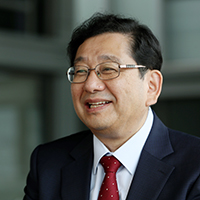
By Yuji Hosaka
Professor at Sejong University
On Nov. 22, the Korean government announced the conditional suspension of its decision to terminate the General Security of Military Information Agreement (GSOMIA) with Japan about six hours before the scheduled scrapping of the accord.
"While bilateral dialogue on export management policy continues, we will tentatively halt our petition procedures against Japan with the (World Trade Organization) on the export restrictions Japan imposed on Korea in three items," Seoul said. In response, the Japanese side at 6:07 p.m. the same day announced the resumption of bilateral meetings of both manager- and director-level officers of the related bureaus of both governments.
In addition, Japanese Prime Minister Shinzo Abe told an informal media conference at 6:30 p.m., "Because of the (need for a) response to North Korea, collaboration between (South) Korea and Japan and that between the U.S. and Japan are important," adding, "I believe (South) Korea must have made the decision (to delay GSOMIA's termination) from that strategic perspective."
Abe seemed to imply that Japan made no concessions, and afterwards, leading Japanese media began to report that he made no compromise.
This is because politicians who favor the Abe administration distorted the truth by calling the suspension of GSOMIA's termination "a perfect victory over Korea."
Japanese Minister of Economy, Trade and Industry Hiroshi Kajiyama said, "Our proper export management will remain unchanged," and Japanese Foreign Minister Toshimitsu Motegi said, "Export controls and GSOMIA are separate issues."
State Minister for Foreign Affairs Masahisa Sato said on Twitter, "Japan made no concessions and the agreement is not conditional. Korea raised its fist based on a misjudgment of the situation and lowered it due to U.S. pressure."
Politician Junko Mihara tweeted the latest news on GSOMIA with her comment, "Oh well… (Korea) acted so tough."
The conservative Japanese daily Sankei Shimbun ran an article quoting a high-profile Japanese official as calling the situation "a perfect game."
Yet such responses from the Japanese side are reminiscent of Japanese media that continued to cry "landslide victory" during World War II when covering a series of battles in the Pacific that Japan lost.
Later, several media outlets discovered the truth that Washington also applied the same pressure on Tokyo as it did on Seoul. This means American pressure was what made Seoul conditionally halt its initial decision to scrap GSOMIA, not the prowess of the Abe administration that resulted in a diplomatic victory.
Furthermore, reports surfaced that Korea and Japan had earlier agreed to have the latter eventually lift its export restrictions, though this largely remained secret. Ritera, a well-known Japanese online media outlet, quoted a journalist from a leading Japanese newspaper as saying, "Allegations that Korea lost the fight sounds way too one-sided. From the standpoint of President Moon Jae-in, Korea has many domestic issues; most Koreans believed that the Korea-Japan GSOMIA should be scrapped. And Korea will hold parliamentary elections in spring next year. So suspending the termination of the military pact was a risky decision politically. But I can't help thinking that President Moon Jae-in promised to suspend (GSOMIA's) termination in return for Japan's lifting of the export restrictions."
The international news bureau of Fuji TV under the Fujisankei Communications Group said, "The U.S. has demonstrated considerably strong intervention in the Korea-Japan conflict by putting pressure on both nations from late October and presenting concrete mediating measures." In the end, both Seoul and Tokyo are seen to have made concessions because of heavy pressure from Washington. If the truth could be told, Japan's claim that it made no concessions is apparently a publicity stunt to prevent the Abe administration from losing support from right wingers.
In particular, National Security Council Director Chung Eui-yong blasted the Japanese government for encouraging its media to make distorted reports. "The Korean government on Nov. 19 sent an ultimatum to the Japanese government that it must terminate the Korea-Japan GSOMIA on Nov. 23 at midnight unless the Japanese side shows a change in its attitude. In response, Tokyo expressed its intent to Seoul that afternoon that it could discuss and reconsider the issue of export restrictions."
Chung added, "The Japanese government then told Seoul that it could reconsider the export restrictions it imposed on three strategic materials used for semiconductor production and restoring Korea to its whitelist of preferential trading partners."
Thus according to Chung's statements, it was Tokyo, not Seoul, that proposed a compromise because of the difficulties in negotiations. Reports say he vehemently criticized Japan on Nov. 24 for intentionally distorting the truth.
"It will be very disappointing if Prime Minister Abe's comments as reported by the media are true. I must question him if he can make such comments as the leader of the Japanese government with no feelings of guilt," Chung said in condemning the Abe administration. His criticism led to an apology from Japanese vice foreign minister who said his government "apologizes for untrue remarks."
Later, however, Japanese Minister of Internal Affairs and Communications Yoshihide Suga denied that, saying, "We, the Japanese government, did not apologize." Yet Suga neither denied or criticized Chung's comments and refused to speak further, apparently fearing a backlash from Seoul.
Motegi announced that he would discuss the schedule for a bilateral summit that was not initially included in the agreement made on Nov. 22. Such actions by Japan prove that Chung was telling the truth.
The economic restrictions Japan imposed on Korea are showing signs of thawing. Strong U.S. pressure has boosted prospects for improvement in Seoul-Tokyo relations. Thus I would like to express my hope for the upcoming Korea-Japan summit reportedly set for Dec. 24.
Hosaka teaches political science at Sejong University in Seoul. As a naturalized Korean of Japanese descent, he is also director of the Dokdo Research Institute.
Translated by Korea.net staff writer Yoon Sojung.
Most popular
- 2 Egyptian sisters reflect on 10 years as Honorary Reporters
- Korea Welcome Week for foreign tourists set from April 25-May 16
- Korea.net welcomes 2025 K-influencers, Honorary Reporters
- Actor Bae Doona's first romcom in decade to hit theaters in May
- 2025 Honorary Reporter class pledges to spread 'real Korea' worldwide
